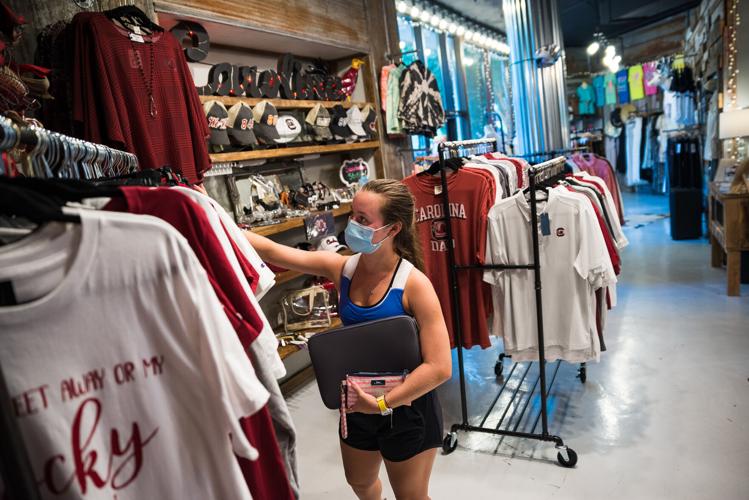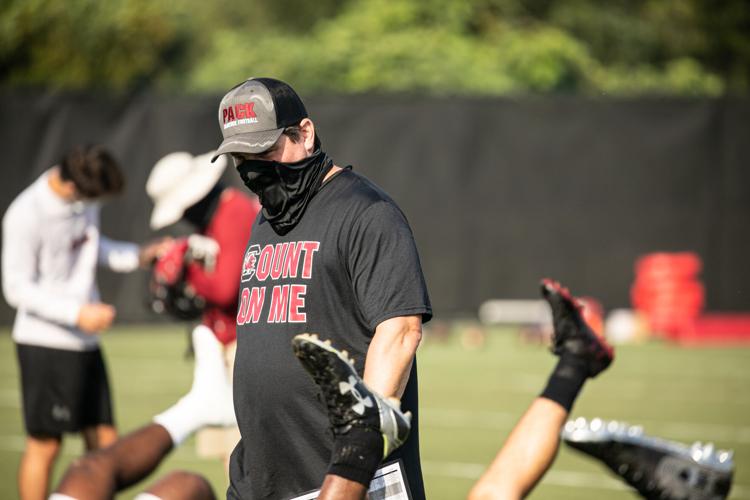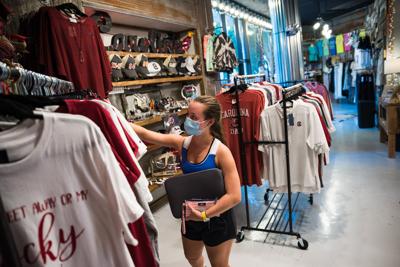When Bob Coble was the mayor of Columbia from 1990 to 2010, he could always tell when it was a University of South Carolina football gameday. That’s when his phone would start ringing if those damn trains were making trouble again.
“I sort of reminisce and miss the days that people would call me raising hell that the train is blocking them and they can’t get in to the stadium area,” Coble chuckles.
Indeed, trains creeping along the tracks across Assembly Street and over near the Olympia neighborhood, delaying tens of thousands of fans who are trying to get to their tailgating spots before a USC game at Williams-Brice Stadium, is just one of the numerous hallmarks of a football gameday in Columbia.
In normal times, the Capital City has an electric feel during the seven weekends a year when the Gamecocks have home football games, with fans from across the South pouring into the city, choking the roads and filling up cash registers and hotel beds.
This fall, however, most of those visitors are likely to be watching USC games from their sofas.
The school still intends to play a curtailed schedule of college football this fall, but there will only be 10 games compared to the normal 12. Just five of those will happen at home, and admission at Williams-Brice Stadium, where attendance averaged 78,000 fans per game in 2019, will be capped at about 20,000 fans. And, thanks to the SEC disallowing non-conference games from the 2020 regular season, there will be no massively anticipated matchup with archrival Clemson.
These adjustments will greatly alter the cultural fabric of Columbia and the economic fortunes of the city and its businesses.
“USC is a lifeline for our city,” says David Erbacher, director of sales for Hyatt Place hotel in the Vista entertainment district. “Our budgets are built on football.”
Making Do With Less
Columbia businesses look to be in a better position than those in some other college towns. USC President Bob Caslen and the Southeastern Conference are pushing forward with a plan to play football this fall, even as other conferences such as the Big 10 and Pac 12 have put off football at least until the spring due to the novel coronavirus.
But with two fewer games played at roughly 25 percent normal capacity, there will be but a fraction of the normal number of fans present throughout the season.
The 20,000 capacity cap that USC announced recently is in line with what other schools in the South are planning, as the University of Georgia announced it would be allowing 20 to 25 percent capacity this season at Sanford Stadium (which would amount to about 20,000 fans), while Georgia Tech says it will allow 20 percent capacity at its games, which amounts to about 11,000 people.
The changes to college football come on top of an already reduced flow of visitors to the Capital City, as COVID-19 has forced the cancellation or postponement of conventions and other major events that reliably bring people to Columbia.
For instance, golf’s Masters Tournament, played in nearby Augusta, Georgia, regularly fills Columbia hotels with thousands of fans, will play its rescheduled November outing with no spectators allowed.
Even as college football’s leadership plans its path forward, restaurants and hotels are bracing themselves for fewer people coming to football games this fall with social distancing limiting seating.
“I don’t know how much the hospitality industry can take,” says Bobby Williams, chairman of the S.C. Restaurant and Lodging Association. “It would be devastating to people that are barely hanging on.”
Indeed, the loss of so many events has taken its toll on hotels, as typical occupancy rates have been cut by more than half.
“In all my years in the hotel business, there’s nothing you can do to prepare for this,” posits the Vista Hyatt Place’s Erbacher.
Each USC football game played at normal capacity brings in about $10 million to the Columbia metropolitan area when you count spending on things like meals and hotel rooms, explains to Tom Regan, a professor in USC’s College of Hospitality, Retail and Sports Management.
“The loss of football will be devastating,” he reasons. “No way to lose $50 million plus and recover anytime soon.”
At downtown’s boutique Hotel Trundle, the bustling fall usually makes up for the slower months that come afterward, according to co-owner Rita Patel.
“It carries us through the slow times of December, January and February,” she says.
The recent USC move-in weekend provided Trundle its first full house of guests in months, Patel reports. Usually, USC orientation weekends bring many parents and guests during the summer but that, too, was canceled this year.
Trundle is relying on a range of travelers to try to make up for some of the college business loss, including regional visitors using the hotel as a “staycation.” But even with these new tactics, overall revenue is only at about 50 percent of what it was the year before, Patel reports.
With one breath, she says he still expects to get some business from football weekends, as many people will likely come to town just to be here or tailgate and watch with friends.
With the next breath, Patel confesses, “I have no idea what is going to happen.”

South Carolina coach Will Muschamp watches the Gamecocks stretch at the start of football practice. Provided/South Carolina Athletics
Similarly, football season is usually the peak of the retail year for Marlo Meredith, owner of the Miss Cocky apparel store on Main Street.
“Gamecock world is a big part of our world,” Meredith says.
The store supplies apparel to the boosters of the USC Gamecock Club as well as youth football camps put on by coach Will Muschamp.
Meredith says she was lucky that she was able to hold off and reduce her normal inventory orders, cutting them in half.
“All of the planning I did for the year, I had to reduce it,” she explains.
At least with a reduced season, Meredith is hopeful those not attending games will still want to don their Gamegock gear for backyard cookouts and to huddle around the TV with friends while watching from home.
“At personal gatherings people are still going to have that spirit,” she said. “You want to be in your colors and want to look your best that day.”
Still, gamedays are the busiest days for the downtown store. Meredith typically hires extra workers for the occasion, but not this year.
“People love their Gamecocks,” she observes. “We’ll still sell a certain amount but it’s not going to be the same.”
Meredith says Miss Cocky enjoyed a strong retail year in 2019 that has kept the store running through the economic downturn.
“We have to keep going, adjust and be smart about it and hope this will at least carry us through,” she offers.
Fewer Drinks, Fewer Eats
Changing the capacity and number of games at USC games will have an impact felt by everybody, says Steve Taneyhill, former Gamecock quarterback and owner of Group Therapy, a legendary college bar in Columbia’s Five Points.
Taneyhill says because he’s located so far from Williams-Brice Stadium, his biggest football crowds come on Fridays when fans of the visiting team arrive in town. Away games also draw in Gamecocks wanting to watch on TV alongside fellow fans.
As students come back to town, football season usually provides a reprieve at Group Therapy following slow summer months with less business.
Even a reduced season will be a serious blow for Bernie’s Chicken in Columbia. Located on industrialized Bluff Road, Bernie’s closes on all but seven Saturday’s each year — game days.
Owner Bernie Shealy says they initially planned to gauge crowds at the first one or two home games. But with the number of spectators reduced, that may not be enough for him to justify opening his doors on a weekend.
“The restaurant business is hard enough when it’s good,” Shealy admits, though Bernie’s has weathered the pandemic better than others since its business is primarily takeout.
In addition to hawking poultry, the longtime fried chicken joint parks cars. Even if fewer people are allowed in the stands, people might have still come to tailgate. But with fewer games, that opportunity also shrinks.
“If that concession goes away, that’s a big part of our sales,” Shealy offers.
Parking creates extra revenue that has previously covered overtime pay and a year-end party for workers. Those seven days represent five percent of the restaurant’s business for the year, Shealy says.
Village Idiot owner Brian Glynn notes that even if some fans are in the stadium, the impact won’t be the same for the Five Points businesses, including the flagship location of his three-location pizza chain.
“In my mind, we have no home games, this year,” he posits.
Brian Glynn, whose business has operated close to USC’s campus for 30 years, says that a chart of his sales across the year wouldn’t need to be labeled: It would be easy for any observer to spot the seven weekends with home games given the big spikes in revenue.
Losing just one home game during the 2015 flood had an impact on the bottom line, Glynn says. Having many fewer fans coming to town for football will mean a much more severe blow.
While he is focusing on delivery and carryout options to reclaim some of the normal business from a football weekend as fans watch at home, Glynn notes that not every business will be so fortunate, adding that a loss of foot traffic will be a further blow to shops.
After a spring of coronavirus shutdowns and a slow summer, a dearth of college football fans will be a further setback, says Columbia Chamber of Commerce President Carl Blackstone.
But while the city gains substantial business from college football, it is not the only game in town, he adds. Columbia has government and business activity, putting it ahead of towns such as Tuscaloosa, home of the University of Alabama, that are focused solely on college life.
Business aside, Blackstone says, health concerns will be paramount: “We are all learning that we’ve got to be resilient going forward.”

Bartender Haley Williamson makes a drink at Group Therapy.
A Hit to Local Government
The reality that USC will have drastically reduced football attendance in 2020 isn’t lost on local government officials, who count on the games to help fill the city’s coffers and contribute to the cultural fabric of Columbia.
At the same time, leaders note that public health in the midst of a global pandemic offsets certain financial concerns.
“It’s very concerning,” longtime Columbia City Councilwoman Tameika Isaac Devine says. “USC football is a mainstay in Columbia. It’s like Christmas and other things. You just expect to have that [revenue]. I think, certainly, we are going to feel the effects financially.
“But, paramount for us is safety. We are certainly expecting USC and the SEC and everybody else to make the decisions that are appropriate to keep everyone safe. If that means we have to forego a [normal] football season, then we’ll have to forego a [normal] football season.”
The city has taken a financial hit during COVID-19, projecting a $24 million less in revenue for the current budget year. While an atypical football season was far from the only factor at play in that predicted budget shortfall, it is yet another area where revenue like will be diminished compared to prior years.
Third-term Columbia Mayor Steve Benjamin strikes a similar tone to Devine in discussing the situation. The mayor has been key in pushing a number of safety measures during COVID-19, including a citywide mask ordinance and new rules cracking down on house parties as USC students return to campus.
He says the economy of the Midlands is “inextricably intertwined with the success of USC” and acknowledges the city’s coffers will take a hit without the typical seven weekends with nearly 80,000 fans heading to Williams-Brice.
But Benjamin, a former student body president at USC, emphasizes that if having less fans at games leads to a better public health outcome, that’s OK with him.
“Our goal is that everyone keeps their eyes on the long game here,” the mayor says. “If we don’t do this right and the students have to go back home, everyone loses. So, it’s incumbent upon all of us to do our share in making sure we are able to execute a thoughtful public health, pro-business plan that allows the economy to thrive and also people to stay healthy.”
Rival Tigers Also Hurting
Clemson, too, is bracing for the lack of fans for Tigers games.
An average Clemson football weekend generates on average more than $2 million in economic impact, the Clemson Area Chamber of Commerce notes.
“All of it kind of wraps into the rolling wave of killing business in a college town,” Chamber president Susan Cohen explains.
Cohen says the school’s release of a football schedule in early August brought some optimism, and commencement could be pushed to an open weekend, creating more economic opportunity.
Your Pie, a fast-casual pizza chain on Clemson’s Earle Street, doesn’t rely on football as much as some local bars, owner Doug Zirbel said, but he has taken measures to remedy a potential lost season. He’s hopeful things will pick up when Clemson resumes in-person classes Sept. 21.
The restaurant traditionally depends on the in-person experience, with customers selecting their dough, sauce and toppings, but in recent months Zirbel has instituted contact-less pickup and deliveries.
Cohen is proud of the creative measures businesses have taken to assuage some of the loss.
“But that still doesn’t necessarily replace that foot traffic in front of your store every day, or those big events when you’re just slammed with excited people with expendable income coming into town,” she says. “There’s really no way to replace those big events.”







